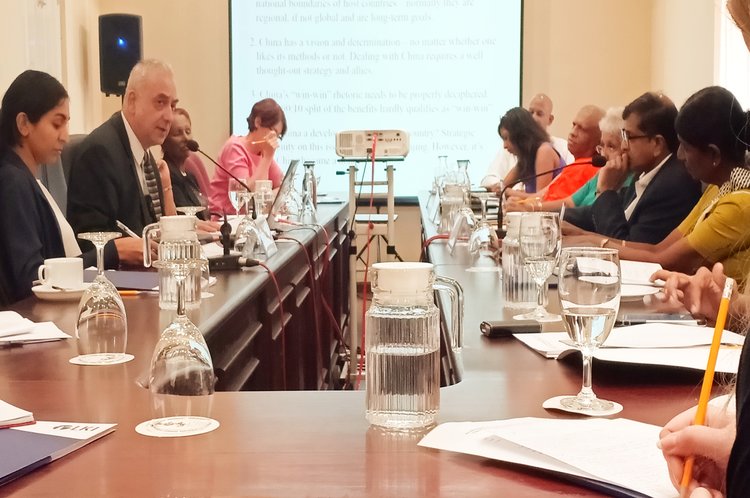Takeaways – Plamen Tonchev on ‘Chinese Investments in Europe and Greece: Lessons for South Asia’
December 13, 2018 Reading Time: 3 minutes

Reading Time: 3 min read
Three key takeaways from the round table discussion with Plamen Tonchev –
- In the wake of a difficult decade for Greece, growing Chinese investment into the country has contributed to closer relations between Athens and Beijing, despite reservations from the EU.
- Greece must have a well thought out strategy that maximises the benefits of Chinese investment–this has not been the case so far.
- Greece’s experience shows that Belt & Road Initiative (BRI) recipient nations should work to ensure the mutually beneficial terms when entering into an economic partnership with China, due to the demand-driven nature of Chinese investment projects.
Introduction
- Mr. Plamen Tonchev is a Senior Researcher and Head of the Asia Unit at the Institute of International Economic Relations (IIER), Greece. Mr. Tonchev addressed a Foreign Policy Round Table on ‘Chinese Investment in Greece: Lessons for South Asia’ on 23 November 2018 at the Lakshman Kadirgamar Institute (LKI). This LKI Foreign Policy Round Table was supported by The Asia Foundation.
- The round table was attended by Dr. Ranee Jayamaha, former Chairman of HNB Bank and Lead Consultant for the South Asia Region, World Bank, and various other representatives of the Diplomatic Corp based in Sri Lanka, the private sector, think tanks and other international and national organisations.
- The subsequent discussion was moderated by Dr. Ganeshan Wignaraja, Executive Director, LKI.
Takeaways from Mr. Tonchev’s Presentation:
Chinese Investment and Expectations in Greece
- Greece has gone through a very difficult decade since 2009, with its economy shrinking by at least 25% and facing a formidable investment gap. China is, therefore, seen as a source of much-needed investment capital. The current Greek government also views China as a counterweight to the European Union (EU) and other Western creditors, who have bailed Greece out thrice to date in return for painful economic reforms.
- Chinese investment projects in Greece focus on the BRI-related sectors of transport, energy and telecommunications, as well as on real estate and tourism. The China Ocean Shipping Company (COSCO) currently holds 51% of the shares of the Piraeus Port Authority (PPA). Since 2008, the output of Piraeus port has increased significantly, however, the Greeks reap limited benefits.
- Athens has made various political gestures of goodwill to Beijing, in the hope that Chinese investment would help the Greek economy stand on its feet again. Unless this happens soon, a “China fatigue” in Greece is likely.
Similarities between Greece and Sri Lanka
- Sri Lanka and Greece are similar in that both face an investment gap and a growing Chinese presence.
- There are also obvious similarities between Piraeus and the Hambantota and Colombo Ports in Sri Lanka, as they are on long-term lease and concession contracts, and are managed by Chinese state-owned conglomerates.
- China’s “win-win” rhetoric needs to be deciphered more clearly. An unequal split of benefits hardly qualifies as a “win-win.”
- China’s objectives are rarely confined to the national boundaries of host countries; they are either regional—if not global—and long-term strategic objectives.
Possible Lessons for South and Southeast Asia
- Question marks over the true nature of “win-win” and the distribution of benefits linger over Chinese investment in South and Southeast Asian countries as well. China-financed projects in Malaysia worth up to USD 22 billion have been put on hold. There are indications that Pakistan, host to the flagship BRI megaproject China-Pakistan Economic Corridor (CPEC), is falling into a “debt-trap.” In Myanmar, the initial price tag for the construction of a China-financed deepwater port of Kyaukpyu is being renegotiated due to fears of insolvency.
- As China’s economic prowess and global reach continues to grow, Beijing must consider becoming a donor to developing countries.
Takeaways from the Discussion:
- Greece has the second largest GDP-to-debt ratio in the world, after Japan. This debt burden is a result of structural issues inherent to the Greek economy, such as high public expenditure, low productivity and inadequate tax revenue collection.
- Now that the three bail-out packages have expired, Greece relies on credits from the international financial markets which keep a watchful eye on structural reforms in the country. Similarly, Sri Lanka has graduated from its previous status, and is no longer entitled to concessional loans from the Asian Development Bank (ADB) or the International Monetary Fund (IMF). Sri Lanka, therefore, needs to seek credits from the international markets with the lowest possible interest rates, and the best way to achieve this is via reforms that enhance the country’s credibility and investor confidence.
- Growing Chinese involvement in the insurance sector in Europe could be attributed to the effects of ageing in China. China anticipates that a huge wave of pensioners will soon leave the labour market, and is interested in acquiring European expertise in social welfare and pension funds.
Suggested Readings:
Phillipe Le, C. (2018). Chinese Investments in European Countries: Lessons for the “Belt and Road” Initiative. Rethinking the Silk Road. [Online] Available at: https://www.belfercenter.org/sites/default/files/files/publication/10.1007%25252F978-981-10-5915-5_10-1.pdf [Accessed 9 December 2018].
Tonchev, P. and Polyxeni, D. (2017). Chinese Investment in Greece and the Big Picture of Sino-Greek Relations. Institute of International Economic Relations. [Online] Available at: http://idos.gr/wp-content/uploads/2017/12/Chinese-Investment-in-Greece_4-12-2017.pdf [Accessed 9 December 2018].
Nicola, C. (2015). Is Europe to Benefit from China’s Belt and Road Initiative? Istituto Affari Internazionali. [Online] Available at: http://www.iai.it/sites/default/files/iaiwp1540.pdf [Accessed 9 December 2018].
